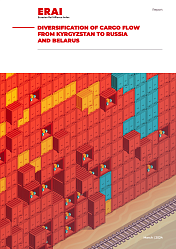How China’s Connectivity Project is Being Reconfigured across the Old Continent — and What It Means for the Euro-Atlantic Alliance
International trade

International trade predetermines the vector of development of the world economy. Now, the volume of international trade is growing rapidly, which contributes to the intensification of production processes and deepening countries’ specializations.

Transit time and possible transport China’s trade with the Global South is growing significantly, driven on the one hand by the China Plus One strategy and on the other by the development of new markets. But many challenges remain.
In the first half of the year, global trade improved slightly, thanks to growth in Asia and the United States, while Europe lagged behind. Expectations for the second half of the year suggest that there will be no significant changes.
The trade relationship between China and the US has been deteriorating, a trend that began during the Trump administration and has continued under Biden. While the EU has been more cautious in its approach, its patience with China’s trade practices is wearing thin, leading to potential further strain in the trade relationship between China and the West.
The rapid development of trade relations between Russia and the countries of the Global South, particularly India, entails the need for the development of transport infrastructure and the organization of new cargo delivery routes
After a 5-year trial, Italy has decided to withdraw from the Chinese Belt and Road Initiative and is seeking to further develop the bilateral relationship outside of this framework

Kyrgyzstan’s EAEU membership has created favourable environment for expanding economic ties and improving the investment climate in the republic. The EAEU countries, particularly Russia and Belarus are among Kyrgyzstan’s priority foreign economic partners.

Belarus is restructuring its foreign trade logistics, looking to new markets, intensifying cooperation with countries that are already importing Belarusian products. Belarus is looking for new transport routes through Central Asian countries, particularly Uzbekistan.
The global economy has entered a state of slowdown that particularly affected the Eurozone in 2023. In addition, supply-chain management must also integrate increasing geopolitical uncertainties.
The potential for trade between two of the world’s most important economic areas — Asia and Europe — looks set to grow alongside rising global trade volumes, even in the face of considerable headwinds including the economic fallout of ongoing geopolitical tensions.
The outlook for the global economy has slightly improved since the WTO’s most recent trade forecast was issued in October of last year but the pace of trade expansion in 2023 is still expected to be subpar, weighed down by the ongoing conflict in Ukraine, stubbornly high inflation, tighter monetary policy and financial uncertainty.
